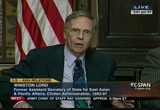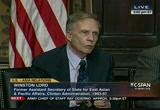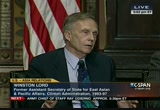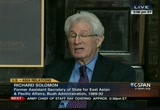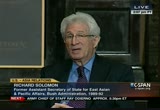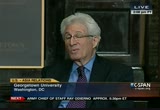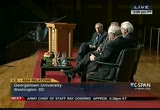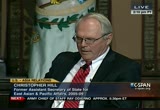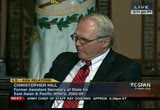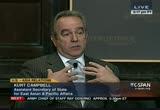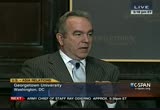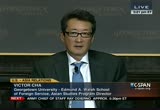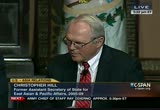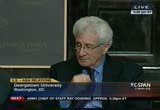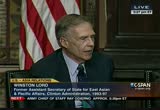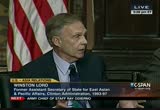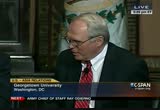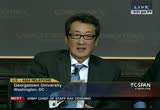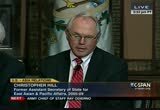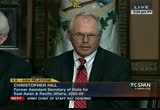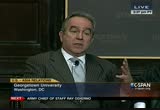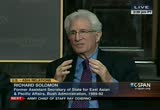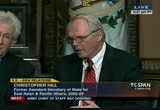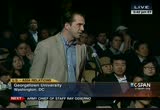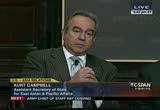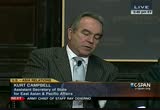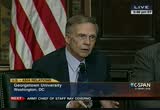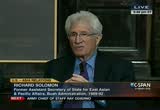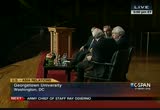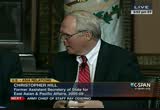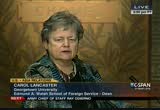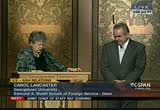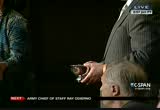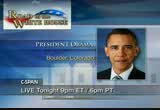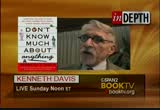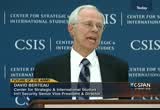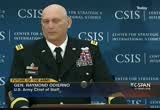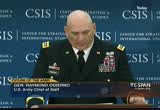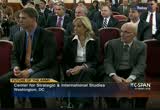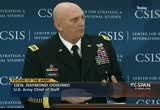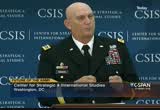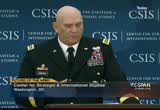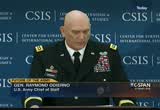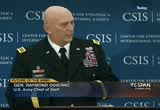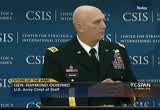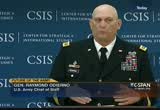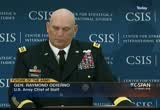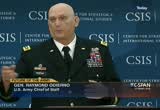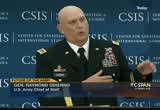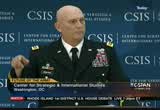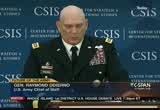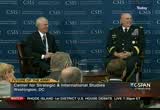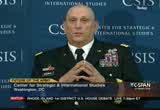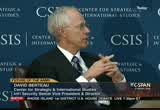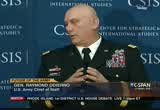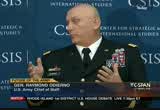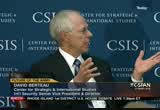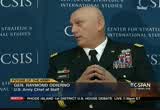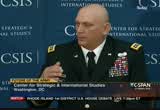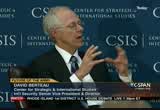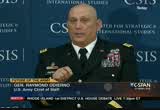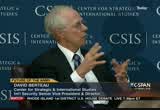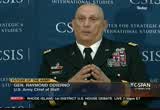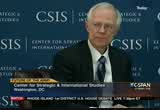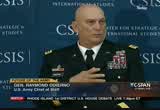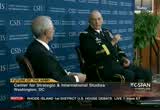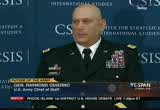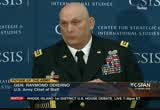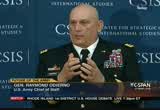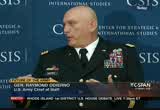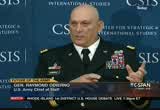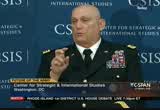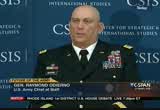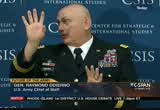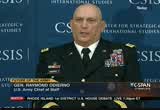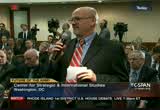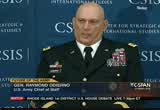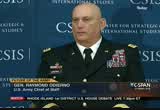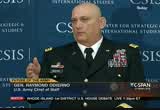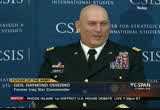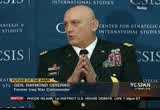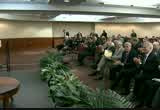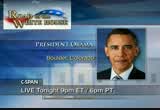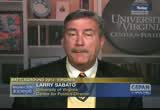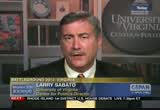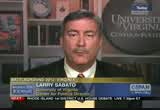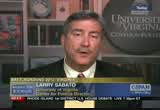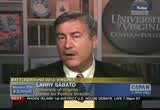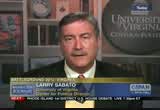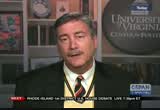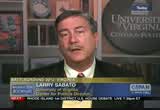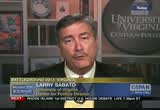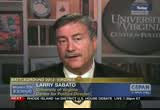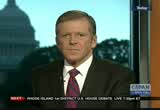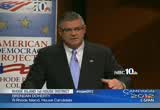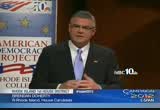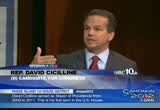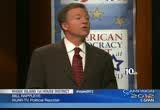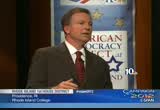tv Public Affairs CSPAN November 1, 2012 5:00pm-8:00pm EDT
5:00 pm
fell, the cold war was over. and a healthy way, we had to greatly expand our relationship with china. at the same time, the human rights issue got much more prominent and it was much more typical to deal with struggle was trying to and how to get this relationship on a broader basis and increase the exchanges. by the time got to the 2000's, our interactions have become much more extensive. i will not get into specifics of the policies. but in we all agree it was a mixed relationship. it will be sweet and sour.
5:01 pm
it will be a mix of cooperation, competition, and contention. i think it is important to keep in mind that there is a floor and ceiling in this relationship. the floor is that we do not have territorial disputes. aiwan. not claiming tie china is consumed with its own domestic scene, although it can be aggressive. we have seen that in recent years. we have many problems be want to work on together and can work on together. we have extensive economic interactions. the relationship is not one of
5:02 pm
outright hostility. on the other hand, there is a ceiling. we have different values and different political systems and conflicting interests. keep in mind, it will have this mix. you need cooperation. we have committees set up at various levels. they are very a important. they want us to stay in the pacific without trying to drive us out. we are not containing them. we need to work on concrete areas where you work on issues of school and bilateral that build constituencies for both relationships. it helps to solve some problems and put into context for the public -- the respective publics
5:03 pm
the fact that we have human rights and other areas of cooperation to keep this relationship steady. i will finish by saying that we should not be overly optimistic or pessimistic. i will go back to that expert, mark twain. he says about music what i would say about the u.s.-china relationship. --said about wagner's music he was a great music critic. britney spears'spair not asand said, "it's good as it looks." [laughter]
5:04 pm
>> thank you. >> let me pick up on a point he made earlier. it is a complex idea. a great challenge that we face and might face is managing this relationship. in this context, i want to stress what i see as two of the major issues of challenge. first, the internal challenge. we tend to assume that china is growing at an% a year -- 10% per year, but i think that is wrong. i think we will see a combination of economic and internal political reasons. china is entering, my guess is a very difficult period. the society has outgrown the political system that brought the revolution.
5:05 pm
we have seen decided grow in the way it has. it has substantial measure because of its economic growth. i like to do this when i give talks about china. this is one of the most revolutionary technologies of any kind -- cell phone. it is relevant because there are millions of cell phones in china. we are dealing with immobilize population. they know what is going on and what is happening in their society and in the world. from my discussions with senior officials in the country, they are feeling enormous public pressure. think of the impact on politics of the bo xilai scandal. the son out covorting abroad with various party girls.
5:06 pm
there have been several high- level scandals that have reinforced what i believe is a growing alienation of the society from the party leadership. as the country enters its fifth generation of leadership, which is about to proceed in a formal way shortly after the election will play out next year, this leadership does face some very fundamental issues. and the open up the political process in dealing with the very substantial measures in the population? that situation will be exacerbated if economic growth slows. the eastern provinces are looking for higher incomes. at in the profits of significant instability will be part of the game.
5:07 pm
what about external relations? the effort to create a greater strategic equilibrium in east asia through the rebalancing process is a risky one. it is risky because the chinese are doing what we are up to not as an effort to maintain stability in the region, but to maintain the working relations that have prevented all the historical animosities surfaced with japan and other countries to keep them under control. as we know from various studies , there is a high level of distrust on both sides. so, strategic equilibrium will
5:08 pm
in fact lead to polarization. that is one of the great challenges of managing the relationship to see that it does not go in a negative direction. finally, to put the china relationship in a broader context, the ability -- i am not sure that is going to happen. the administration is trying to disengage from these very heavy military engagements in iraq and afghanistan and that part of the world, think about a situation where the balloon goes up with iran and we are in a fight over the nuclear proliferation problem there. think about a situation where afghanistan or iraq does not go and the direction we are hoping for. we might find it much more difficult to disengage from middle east and south asia.
5:09 pm
those are issues that we're trying to put more emphasis on this important east asia relationship. i am not sure it is going to play out that way. mr. negative here, i did we have to look realistically at both the costs and possible developments in china and in international affairs. >> first of all, i agree with a lot of what the assistant secretary solomon said. and in the issues in china are driven by domestic issues. i think we need to be a little careful about the sort of solid ticism. there are things going on in china that are not about us. how do we treat china through these issues? how do in managing the relationship when they are
5:10 pm
clearly having convulsions internally? the issue of bo xilai, this is about a corrupt politician the way that moby dick is about a whale. i did we need to try to understand it a lot better than we do and certainly a lot better than what some of our media tries. things are getting very dicey. the social compact is beginning to fall apart. growth is not going to the press. what is this doing to the aspirations of the society that is clearly outgrown the economic process? especially when the economic process is not doing what it is opposed to. i'm sorry. it has clearly outgrown the political security state that
5:11 pm
manages all of this. when the political security state does not manage the economy, that creates enormous social tension. not everyone of those social tensions has to do with chinese and demanding more human rights. of course, that is going on, but what is also going on is a public that is becoming increasingly nationalistic. they look to the government and say, out why have you not secure the raw materials in said he would secure? some of the reason belligerence, which is perhaps too strong a word, some of this toward china's neighbors as part of this churn. we have to watch this very carefully. it is not in our interest to make the countries that have benefited tremendously from
5:12 pm
china's growth -- look at china's growth rate. it is not in our interest to make these countries choose between us and china. it is in our interest to be very much present. when we eat pivot or rebalance -- when we pivot or r ebalance or -- >> piroutte. [laughter] >> we're somehow becoming an element in the debate within china. finally, and has spent time and some of these places in the world, richard, you are right. we will not be disengage from the middle east and south asia.
5:13 pm
far from it. we will be very engage. i hope it will be an engagement of a diplomatic kind and we will not have a trillion dollars going into iraq again. if that is what looking at, we cannot manage all of these issues simultaneously. i think we can be engaged in these other countries and still keep in mind the fact that china and the rest of east asia is really quite essential to our interest. i think our country has its work cut out for it. for those people who think that somehow the u.s. is in decline and china is in the rise or india or something, have a look at what those countries like china and the problems they have every day. ask yourself where you would like to exchange and boxes.
5:14 pm
i doubt it very much. finally, i will share some insight i gained from living in the western part of the united states. our country will become energy self-sufficient at some point. i am not saying it will happen tomorrow. that will be a huge game changer. what has been described as our achilles' heel for years and years, this notion of this declining and weak u.s. economy, even that will be changing. when you hear a country like japan looking at off the table type of demographics or japan which is now gone from 128 million people has gone down. we're looking at 70 million people in our children's lifetime. japan is foreswear nuclear energy because of last year's catastrophe.
5:15 pm
the look at the united states. we are going to be a very big player for years to come for a lot are reasons, including our economy. i think it is a good time to look at this. we are not in any kind of declining mode. we'll be more important in the coming years. >> i would like to respond to one thing. i was thinking about what the last to the speakers were talking about. whether we should be optimistic about whether this can be sustained. i think the challenges are greater than richard laid out. i am optimistic we will be able to deal with that. i think in terms of commitment, we will have a double pole. one poll will be the continued need to be engage in the middle east and south asia. look at the history of modern american engagements. what we have done really gone
5:16 pm
after periods of intense air marshal engagement is come, after the cream war and vietnam and the second world war and the first cold war -- after the korean war and vietnam and the second world war and the first world war. there is also enormous challenges on the personal front. one of the things i've been struck by is that 15 years of war and a focus on the middle east will lead your diplomatic or intelligence career specialists and military to focus a lot on those areas. our governments are heavily skewed toward those challenges. we have to create whole new generations of people like we did in the 1950's and 1960's
5:17 pm
that have much deeper knowledge of asia as a whole. i believe we will be able to do it. it will be an enormous challenge. it will take time. that will be across the every institution. that is why the georgetown school are so important. it is also the case that if you look at american economic performance, we have done an incredible job of resorbing asian goods. if you look at the penetration of american goods and services into asia over the course of the past 20 years, it is not particularly impressive. we will have to do a lot more to rebalance the economic relationship so that we save more and sell more to asia to create a more sustained engagement. ultimately, what will spur us on is exactly the thing that chris just mentioned.
5:18 pm
we respond best to a challenge. that the challenge will come from asia. there have been many times in the course of the last 30 years where there are rumors of america and the rise and decline have animated the strategic thinking of asia. each time countries have bet on that, the have that wrong and have lost a lot of money. that will happen again. the fundamentals of american economic performances are there. i personally believe there is this bipartisan commitment. i see very clearly in the institutions that will drive the asian-pacific century. our navy, our air force, there is a recognition of were the challenges are. there is a really exciting
5:19 pm
ideas and a bubbling up of initiatives. you name it. it is taking place across the realm. there is nothing like success to make people want to remain engage. we have spent a lot. we have lost all locked in some of these other places. -- we have lost a lot in some of these other places. even when we have not been fundamentally successful in the violation stage -- valuation i think that will continue in the future. >> i agree with him. adding our challenge is within -- i think our challenge is within our own society.
5:20 pm
the toxic nature of our fiscal risk and the lack of bipartisanship now, politically and economically, that is the single best thing we can do for our china policy and what we can do for our foreign policy and. we are way ahead of everyone, including china. we have the best universities. we have entrepreneurialism spirits. we have a political system. i will take us over china and others. we're all gonna be thinking about the polarization next tuesday. we have the trifecta of stimulating the sluggish growth, getting on top of our debt problems, and investing in our future of the same time. i think we can do it.
5:21 pm
if we can, there is no reason to talk about american decline. >> i want the students, friends, faculty, please start thinking about questions. linocut the microphone. i do not know how many we will take because of time constraints. i want to ask our guests one other question about the future. in many ways, every administration is tested not by the things that they plan to do, but to the things that happened that they did not expect. the surprises. i guess the question for all of you looking to the future is what do you think will be the surprise for the next administration in asia? we will start with chris and work our way back. >> the quick answer is i do not know what a surprise would be in.
5:22 pm
it is a surprise after all. [laughter] i believe that what is going on in china domestically, i do not think we really understand it. i think real surprises could come out of that process. i am not of the view that somehow china will break apart or something like that. i do not feel that china will continue to bubble along the way it has. i think there are some deep currents there that are running. the other thing, four years you were saying? i would not be surprised if some big issue came up in korea. i relate them to china in a sense that i think the quality of our dialogue with the chinese and needs to be stepped up on that issue. for example, we have had an
5:23 pm
operation called 5029. whether it needs to be redacted or something in some areas, i would like to sit down with the chinese and make it abundantly clear to them what we would do and what we would not do in the event that north korea somehow has a -- i do not think we have any interest in stationing troops there are putting listening posts on the river. i do not think we have an interest in her name in china -- hurting china's profile. i have had some of these conversations. we need to be systematic to the point where the chinese start responding and have a real conversation about it. this will discussion about china and the united states, year that
5:24 pm
china is some kind of collective not and believes in act-- collective now and believe in x. >> i want to reinforce chris's instinct. i believe there is a good chance that north korea will parole and burma -- will pull a burma. i worked with people who want to see their country dependent on china. and the north korean have always tried to maintain a measure of flexibility by having two major powers they can play one against the other. one possibility is that we would be approached by one leadership
5:25 pm
say they want to improve relations. they do not want to be totally dependent on china. i would not expect their approach and say they're ready to give up their nuclear program. we might be in a position where our government is going to have some interesting possibilities that might will run against all the political push back that you can imagine from congress and the media about how we could start a dialogue and be more flexible with this huggable regime up in north korea. there is a possibility. there are some signs that -- remember that image of him appearing with his wife? it was some kind of cut the event. there were some figures that look like many and -- mouse. i said,-they looked like mickey
5:26 pm
and minnie mouse. i think their efforts to try to bring about change will have a tremendous push back the military or not prepared to live with the consequences of that change. it is an internal implosion. i agree with chris that to watch north korea. >> i agree. first, we need to have some disagreement on this panel. i will be surprised if we have another burma and north korea. i do not think it will happen. the trouble with the chinese is that they will not talk to us.
5:27 pm
the needs to be some unilateral position to get them to respond. this is a possible danger. if there is a collapse of north korea, the danger of the chinese going and and their art nuclear- weapons and refugees -- and there are nuclear-weapons and refugees. again, it is not really is a prize if you are predicting it. -- a surprise if you're going to predict it. do not start predicting. i give you a little anecdote. last year, vice president biden went and spent a week with the next leader of china. i was in washington after that trip. i went to a high ranking
5:28 pm
administration official who had been on that trip. what is she like? the guy said, this is someone -- what is he like? >> the guy said, this is someone we can work with. this is good news for it chinese relationships. two hours later, i spoke with another administration official who had been on the trip. what do you think? this guy is dangerous. he is a nationalist. we are in deep trouble. i swear to god that is what i heard. [laughter] we did not know if he would do dramatic reforms. i think we underestimated him. with hu jintao, it was more repressive in certain areas that was when i was an ambassador in the late-1980s. if they do not make changes in the economic and political
5:29 pm
system in the next decade, i think we will see real instability. that could in turn mean aggressive foreign policies that would rally the foreign citizens against the devils. i do not know if that is is a prize. maybe it is. -- i do not know if that is a surprise. maybe it is. >> one of the surprises that happened in the last four years was what happened in burma. i think the administration was involved early on. you were going there and other people were going there. it was not like we were sitting around and suddenly this happened. what is very significant about the obama administration was at once it happened, they did not necessarily look around and say, what should we do? they did not hold back. the kind of pounced on it.
5:30 pm
whoever is running foreign policy amongst their time, when something good or bad happens, get moving on it. i think the obama administration really moved on this issue in burma. i think this has helped the process go forward. it is not just surprises, but how you react to them. i think obama did a great job on burma. >> for the first time in my life, i think i will listen and observe. [laughter] my staff is going, i cannot believe it. i hate having to put them through working for people like us. i will say this about strategic surprises -- i never in a million years thought that i
5:31 pm
would come home to my daughters doing this cowboy thing dance around the living room singing "gangnam style." [laughter] >> i do not know if we will be able to take everybody's questions. if you can state who you are and possibly address your question to one of our panelists. please make your question concise. >> hello. thank you so much for all of your expert in sights on this excellent program. i must add that it is great to be back here as an alumni.
5:32 pm
in the beginning of your opening remarks, the common theme was the challenge of tension. i am glad you brought of north korea. it is hard to shed light or attention on a small country which is north korea. as we know, north korea has essentially changed the game with their program. it is virtually impossible to verify enriched uranium. going forward, there are likely to change the nuclear policy. is there an inkling of hope? if so, where do we start on the nuclear front?
5:33 pm
these are back in 2008 when it broke down? this question is addressed to two men. thank you. >> the first is not to walk away or say that it is not important or argue this is not a reason to do other things rather than address it. i think i run a clean people who often say -- i think people often say you cannot agree -- people who saythis this are kind of letting the north koreans off the hook. it is basically a gritting the predicate for the idea that eventually -- creating the predicate for the idea that
5:34 pm
eventually will let them create a bomb. it is dangerous for the region. i think we need to stay engaged on it. secondly, people who cannot really answer the question of how to get it done? and to the format. the three want more talks? -- do we want more talks? i think we ought to leave? six. if someone's to come in or drop out, fine. -- i think we ought to leave it act six. if someone wants to come in or drop out, that is fine. the reason that it did no work done in 2008, it was not just il and that whole
5:35 pm
issue. they give as an incomplete declaration. we are prepared to live with that. we would not believe that even if it were correct. we needed a verification regime we could get on the ground and looked at undeclared sites. obviously if you cannot look at and declared sites, you do not have a verification regime. we were not able to get there. we had to end negotiations. i does suggest that we just hammer away, especially with the chinese and getting some kind the verification regime to verify and to explore what is really going on there. i agree with you that the uranium enrichment is very difficult. frankly, we still do not know what it is. they have put a lot of
5:36 pm
investment in it. my main point about mercury is that we should be doing all of the above. and i was engaged in these negotiations, people in these meetings would say they want to avoid this north korean shift, but we do not want to interfere negotiations. my reaction was, i do not care if you sink the thing. i do not -- i have no problem being tough as nails on the strategies. the problem was that we could not undo anything. it is a lever that once used, you could not control. that is where you have to look carefully in what you were doing. if you cannot undo or use ti as means for policy, you
5:37 pm
better be careful in using it in the first place. we should do maybe some things that i suspect others are doing in iran. i do not know. i think we need to be active across the board in a sort of all of the above format. diplomatic negotiation is part of that. >> that was a very good question. i got back from north korea. i had a chance to talk with most of the advisers of the political candidates. they are all different. i would say that each campaign was very determined to maintain a strong relationships with the united states. it is reassuring. that is our hope going forward. i think it is also clear that there is a strong desire among the key advisers of all the
5:38 pm
candidates to have another go at diplomacy. one of the most important features of reason diplomacy with north korea has been the the united states has worked closely with south korea and where we can with china and obviously closely with japan. we are very much engaged and working together. it is not the united states leading and others following. one of the things we will have to watch carefully thought to the new government comes into power after election, there is this leadership change in china and elections in south korea and elections in the united states and probably a change in the garment in japan. it leads a very exciting and challenging -- government in
5:39 pm
japan. it leads a very exciting and challenging period. >> just a brief perspective on this very interesting issue. if there is going to be a danger in our dealings with the north korean situation that will break us out of the stalemate, it will require something that probably is politically impossible for us to swallow. starting from the promise that we are prepared to recognize the security of a north korean regime, that is at the core of their desire for a bomb. politically, you can imagine the uproar of a negotiation where we have built into -- guarantee might be the wrong word -- some
5:40 pm
might say that north korea has a right to survive and work out its own problems, which is very substantial. if that is the change in promise, the way he would get a deal is with china and south korea and the united states in some operational way recognizing that north korea is there and it will have to work out its own problems. for the north koreans, the context would require them saying that the security is not based on having atomic weapons, but having a viable economy. could there be a game change that would lead to fundamental changes on both sides in that promise? that is the opportunity of the challenge. that is what makes it hard to see the progress. >> in the september 2005 statement, we expressed a willingness to give them
5:41 pm
security guarantees and to have recognition of states. we put everything on the table. what we did not and will not put on the table is the idea that we should do all of those things with a nuclear north korea. again, we were prepared to look at sequencing, but we are not prepared to say that north korea can be a nuclear country. maybe someday in the distant future there will disarm. >> are the two people? could you ask your questions together? not to gather together. -- not together together. [laughter] please, go ahead. >> secretary clinton has
5:42 pm
implemented a review of diplomacy development. i was wondering how you assess the impact has had on the way you as develops policy the-the u.s. -- the u.s. develops policy with asia. >> hello. i'm a doctorate student here at georgetown. my question has to do with military relations. you mentioned the air force and navy withdrawing from the region. the military relations are less than robust. d.c. minimal relation as important? in what way is what our energy be best spent on military relations?
5:43 pm
>> we will use both of these as an opportunity for all of our guests to make their final comments. >> thank you. i think it is helpful of the diplomacy review. it recognizes some of the challenges we face not just in asia, but globally. it was a good review. the key is resources going forward. secretary clinton has been a heavy weight. ieven in that environment, it has been hard to convince others of the need to sustain necessary levels of funding for diplomacy. what we really have is a government with one institution or a collection of institutions that are basically on steroids. the rest of our government, which is essentially on life- support. that is hard to sustain.
5:44 pm
one of the things i like about the state department is that you need to get back -- get by on cunning and strategy. you do not have the resources the other branches of the government has. the hope that there will be balanced in the account period ahead, the new budget includes the state department as part of the national security as a whole. i would not hold my breath. i think it will be hard making the case robusta diplomacy. my hope is that it will be a bipartisan effort. it will be challenged not matter much. my primary -- it will be challenged no matter what. we need something that will allow our forces to do several things. first, we need a robust change of views on strategy and our
5:45 pm
overall approach is. the kind of thing that chris laid out on talking about several scenarios that are appropriate, those are things that people have thought about. it is also the case that we have to be -- we have forces operate in proximities much more often than in the past. we need those in place that prevent unnecessary escalations or accidents. negotiating frame works at allow for operational and practical solutions and approaches is going to be essential going forward. on our part, we need to train all degeneration of officers who really do not have much in the program, but we need to train the next generation of military officers with a deep knowledge is of language and experience to better enable them to do their job and understand the strategic at mr. in which the
5:46 pm
opera as a whole. i think we have to be cognizant. it is not going to be elected was in the past. i worked during a time there was an honors -- it is not going to be like it was in the past. i work during a time where there was time sorry work together. -- where we worked together. it is an essential feature. we need a healthy relationship between the united states and china. >> i commend administration for having the strategic dialogue and military leaders to go along with the political and economic dialogue. it is the most vocal and most
5:47 pm
fragile. there are real dangers or we could fall into conflict. the are contingencies in korea. two others are maritime issues. we are close to chinese borders. we have different views on what you can do in the economic zones. the south china sea and the east china sea in asia. there are treaty allies like the philippines and japan. the other one we have not talked about is -- that of an incredibly difficult issue. final thought, whatever we want to do with asia as a whole,
5:48 pm
we're talking but asia and not just china. it goes well beyond china. i could not agree more with your approach. all this is irrelevant if we do not get our act together at all. if we do not get over this gridlock and solve our economic problems, everything else we do in foreign policy is irrelevant. we have got to do that for credibility as a world leader and with our allies and against our possible enemies. the american people have been through tough times. if there are economic prospects and the political atmosphere in
5:49 pm
washington is healthier, there'll be more sanguine about their destinies. they will be willing to support american leadership abroad. >> i think to turn the issue around, i want to see what will come out of this leadership transition. i think the chinese military has been somewhat out of control. there are a series of incidents going back to a thing in 2001 were at a tactical level, the military was taking some provocative actions that embarrass the political leadership. the military is not well represented at the very top levels of the chinese political system. i want to see what will come out of this transition. we have heard the chinese establish a national security council to better coordinate
5:50 pm
military and civilian activities. they have had troubles in getting the bureaucratic handle on it. i think the future of that and our ability to work in terms of relationships with our own military being affected in a fundamental way by what comes out of this transition. in china. >> i guess i am standing between them and their dinner or something. [laughter] >> first, i think one of the things the administration has done farewell to improve the relationship within this country -- it does not been easy, especially coming out of a global war on terror and in iraq and afghanistan. i think it has been very
5:51 pm
important that we restore this balance and effectively to the extent that other planning has played a role, i am in favor of all of them. second, i would like to second in his comments on the fact that we need to get our act together in the terms of our domestic politics be done. i worry sometimes that that there are no limits to what is said. the are no limits to were the game should be played. it is really harming our foreign policy. there needs to be a very pointed notion that our politics stop at the water's edge. that seems like a distant memory today. our foreign policy is really a
5:52 pm
open to all kinds of brutal political in-fighting. it is caused by a lot of things. it could be the internet gives everyone a platform to have an opinion. and that is terrific. it gets very nasty and very personal. it will ultimately erode the willingness of people to take these crazy jobs. i will never forget my daughter when i called her and she asked, "daddy who?" sarcasm at that age is not a very good. [laughter] we need to rebuild some bipartisanship. what a good place to start in
5:53 pm
asia. i think this is where our country's future is. this is a good place to start. i did not want to fixate on china, but that is a major challenge to us as we go forward. if we cannot develop or continue to have this kind of consensus of building relationships and not just transactions, but the need for very broad and deep relationship, i think we will have trouble. >> at this point, i would like to invite our dean to say a few words.
5:54 pm
>> thank you. we're very fortunate here at georgetown to be able to host this distinguishing gathering to policiesr country's with asia. we have had a conversation here that is both bipartisan, but with differences of opinions. the tenure has been bipartisan. i think that might reflect at some level a continuing tendency some of our political discourse to end at the edge of the country. this has been a very hopeful exchange with a lot of interesting views. we talk about bipartisan and
5:55 pm
polarization. i think we have reason to be optimistic on the basis of this conversation that there are a lot of basic agreements with some interesting disagreements. i want to thank both the theident's office and korean institute which co- sponsored this event with myself from the school of foreign service. in good tradition, we cannot leave without giving you a gift. let me invite you to the podium. i hope this is not a terrible surprise. one of the most significant foreign policy initiatives -- >> sorry. >> i should have warne dyou. >> he has boots on. interesting.
5:56 pm
>> america has prioritize the asia pacific region. the key strategy for the foreseeable future. over the past four years, we have seen america solid date our alliance with institutions in asia and in southeast asia and continue to a prosperous economic trading order throughout the region. many have contributed to these policies, but these could not have been accomplished without your work. he has invested many hours on airplanes and for not ministries and conference rooms and on the telephone at home -- and foreign ministries and conference rooms and on the telephone at home. your commitment and good humor are known throughout asia. we at georgetown want to
5:57 pm
recognize your work with the georgetown asia award. >> thank you. [applause] thank you very much. >> this is a commemorative award that is inscribed with his name. it says the georgetown asia award presented to kurt 2012.ell, november i am told by my notes of that there is a photo op. do you want to do a photo op? >> i was leaning over to do it. [laughter] >> we will put that up on the website.
5:58 pm
we are honored to have hosted this event, along with our friends from the korean institute. thank you to our guests and to all of our attendees for being here. that concludes this event. we wish you a good evening. [applause] [captioning performed by national captioning institute] [captions copyright national cable satellite corp. 2012]
6:00 pm
>> will renew house, senate, and governors debates heading into tuesday's election. tonight at 7:30 eastern, representative cicilline and doherty. >> these are that story's textbooks left out. they are great stories about real people in american history, very important moments in american history that we don't know about. the first pilgrims in america came 50 years before the mayflower sailed. they were french. they may blind. that had the good sense to land in florida in june instead of september in massachusetts, but then the -- that were kept out
6:01 pm
-- wiped out by the spanish, but we let that out of the history books. in the middle of the night, she killed her captors, realized she could get of bounty for indian scalps. she went back and scalped them, made her way to boston, where she was a heroine. the per se statue of an american mom and showed her with a hatchet in one hand and a scalp and the other. with a best-selling author, the most recent, "don't know much about the american presidents." >> the army chief of staff, general re odierno said there is incredible uncertainty across the globe. he talked about how the army is
6:02 pm
dealing with the threat. >> years ago the pentagon -- the auditorium had a podium that required a microphone. this user command equipment is really difficult. welcome to the center for strategic and international studies. that sounds real. all right. good morning, welcome to everyone in the room. welcome to our viewers on the web this morning. i'm david berteau, director of the international security program here and the host for this morning's military strategy forum. we have been doing these forum for about a dozen years now almost, and it's due in great part to the generous support of rolls royce north america, we thank you for that support. without which we couldn't do this program.
6:03 pm
it's a pleasure for us to have with us this morning, the chief of staff of the united states army, general ray odierno. general odierno is from new jersey. anybody who is from new jersey these days has been a little bit distracted. new jersey took the brunt of the storm. i grew up in louisiana. we are sort of used to this sort of thing, but we don't usually have hurricanes that have a wind chill and snowfall associated with them. which complicates matters. i hope everyone's all right up there this morning. we have been doing this series recently focusing on where are the military services going? ofs a very important point history. general odierno started in the army back during not the last draw down but the one before that. the one after vietnam. those of you who have been coming to our events know we have been talking about draw downs for some time now. eventually it had to get here and we are now at the cusp of one. we don't know how long, far, or deep. but there are a lot of lessons from the past that need to be
6:04 pm
applied to this going forward. there are also a lot of ways in which it's different than before historically and we'll explore some of those this morning. the way we are going to lay this out, make sure you turn off your cell phones so we have no noise makers in the room other than the authorized ones. we are going to have a short discussion, general odierno will give an address from the podium here. we'll have a chat here on the stage. and open up the floor to questions. in order to maximize the number of questions that we can get asked, we are going to ask you to use the note cards. i think they have handed out. if you don't have one, can you raise your hand, you'll get one. you write your questions down, try to make them readable, hold them up when you are done and people will collect them. we have in front here a couple experts who will simulate the questions and they'll ask you the tough ones once they come around at the end here. so that's where we are going to work that. i want to welcome you-all again and ask you to please join me in a warm round of welcome for
6:05 pm
general ray or deerno. as you -- odierno. \[applause] >> thank you very much. i guess i remembered to turn mine on. it's great to be here, have this opportunity. when we talked, we thought we get 30, 40, 50 people. looks like we got a few more than that. i appreciate everyone coming out today. i want to talk about several things. i'll take about 10 minutes and just give you some of my thoughts. i really want to leave a lot of time for discussion. i think that will be the most beneficial thing for you and for me. i don't mind tough questions. those are usually the best that you get a chance to answer. again, thanks. i want to thank csis who for 50 years has provided these valuable strategic insights and i appreciate the work by. he kept telling me i was stuck in rome. rome n fall, it's nice.
6:06 pm
but he really was trying to get back. i appreciate the effort, sir, as always. david, again, thank you so much for taking this on. one of the things that i initially talk about is as we look to the future we got to also figure out where we are today and how we get to the future. because it's just not about going right from today and you get to the future. you have to work your way through a series of timelines and other commitments that you have. so let me start out by reminding everybody that as i stand here today, the army has 60,000 soldiers in afghanistan. we have 15,000 soldiers deployed in kuwait, kosovo, philippines, sinai, horn of africa. we have about 90,000 soldiers and civilians forward stationed across the globe in nearly 160 countries. so that's where we start from. as we now look to the future and look at a new defense strategy as we try to work through what the roles of the different
6:07 pm
services are and the defense strategy, i also remind everyone that we are also going to be downsizing during this time. the army, who at the beginning of calendar year 2012 was 570,000, will go down to 490,000 in the active component by the end of 2017. we have significant deployed commitments. we are downsizing our army, and we are now looking to the future. one of the main thing is we have to do is ensure we have the right mix. i always talk about my three rio stats that the secretary of army and i pay a lot of attention to. end strength, modernization, and readiness. because in general terms those are the drivers of our budget. we have to keep those in balance. we want to learn from the lessons of future -- past draw downs. some of the lessons is you can't get out of balance. because if you get out of balance you start to have an unready army. which leads to a hobbled army.
6:08 pm
we talk about task force smith and its impact and unpreparedness as was asked to go into korea post-world war ii. we don't want that to happen again. the second of the army and i have been very clear that we are committed to make sure that we are ready. so no matter what size we end up the one dominant factor is we'll be ready, modernized, be prepared to do whatever mission we have. we've got to make sure we keep that balance. we got to keep reviewing it and adjusting it. we got to make sure that we have a ready capable force to meet the future missions. that's what we are focused on as we go forward as well. we got to make sure we have the right mix of forcers. when i talk about mix, it's about light, heavy, medium. it's about active component, reserve component. it's about the right mix of civilians, military, and contractors. it's about the right mix between the operational army and institutional army.
6:09 pm
you have to get all of that right as you move forward. and you got to figure out what is that right mix? what are the qualities you think you need to have as you go forward? so we have to learn from the past. but we also have to capture recent lessons. then we have to see how do they apply to what we think the future operating environment will be? so it's about learning from the past, it's about applying the right lessons, but it's about how does it apply to the future operating environment as we go forward? so we have to update several things. we just rolled out brand new doctrine. the first time the army has done an extensive doctrine in recent memory. and we have published the initial high level documents of our doctrine, we'll start to publish the subelements of this over the next six, eight months. it represents some of the lesson we learn and how we think it a-- it will apply to the future.
6:10 pm
this is key as we start to look to the future making sure we are based in what we believe is the way forward and we do that by writing doctrine. we have to look at operations, type of operations. what are the best way to train our forces for the future? one of the more important thing is how do we develop leaders? we believe one of the most important things we have to do is adapt our leader development programs. what i mean by this, about adapting leader development programs from the time you start as an rotc cadet or da debt at west point, all the way through the time are you a general officer. how do we adapt those in order to be able to understand and operate in the complex environments that we think we are going to have to do in the future? we have to implement new d.o.d. strategic guidance which the army in my mind play as critical role. the army will and continue to be an indispensable part of the joint force. and although we sometimes talk about army, navy, air force, marine corps, it is about the joint force. it is about the sin ergey gained from all the services in order for us, in order to meet our nation's needs, and that synergy and balance necessary to
6:11 pm
move forward and implement the new strategy. one of the issues i always have as the army chief, when people want to do an evaluation of the army, now look at brigade combat teams. how brigade combat teams you have, how many you need for the future? that's important. that's fundamental to what we do. however people tend to forget many other parts about the army that are so critical to us supporting the joint force. first, 75% of the operational force and special operations forces is army. can't forget about that. we have to make sure we stay responsive to civil authorities. for example he we have continued to make sure we have the right capability to respond to wildfires, hurricane relief, as you see what's going on today up in the northeast. we have provide add broad range of essential services today to combatant commanders, that
6:12 pm
includes intelligence, surveillance, reconnaissance for all the geographical combatant commanders. we provide air and missile defense for all the commanders. we provide logistical support for all the geographical combatant commanders. we provide signal communication support to all the geographical combatant commanders. these are key critical missions that people tend not to think about. as we go forward. so it's important that you understand that. we provide key for aviation, fires, information operation, civil affairs, military police, wmd defense capabilities. corps of engineers who are pretty busy today and doing many other things. we have critical components of the military space program. for example, we are responsible for everything from the satellite on down to the ground
6:13 pm
station in providing communications based on space elements. a lot of people don't know that. that's the army's responsibility. as we look ahead, obviously cyber is one of the more important things we have to remember as we go forward. as i look at cyber there's a couple things, you have national level and operationalical and how we develop this for the future and what does it mean for foot ture way of conflict. how do we integrate that into our operational tackical forces? how do we protect our own networks? all of this will be critical as we go forward. now we have to put that against what i consider to be what is the operational and strategic environment we are going to have to operate? there's much discussion about this and there should be a lot of discussion about this. the one thing do i know is there's incredible uncertainty as we look to the future. every monday i have my intel people come in and brief me on hot spots. and we put a map up and all i know is, i can go through -- coy spend a whole afternoon talking about -- i could spend a whole afternoon talking about the hot spots.
6:14 pm
it covers the entire map of the world as we talk about hot spots and potential areas of instability as i would call it. what we -- one of the drivers of instability that we face and how are we going to meet and try to reduce those drivers of instability that impacts our national security? whether it be in the middle east, which you read about every day, whether it be syria, iran, whether it be pakistan. continuing work in afghanistan. the sunni-shiia fault lines in the middle east. whether it be the pacific with the rise of china. we look at what's going on with the islands within the pacific. korea, 29-year-old leader in charge of korea. what is he going to do in the future? you have narcoterrorism, transnarcoterrorism, what does that mean to the future and security of our country? i don't know. but these are questions we have to take a look at. and these are questions that we
6:15 pm
have to be prepared to operate in. the other thing that i have learned frankly, the hard way, over the last several years my time in iraq is you have also have opportunists who will try to take advantage of instability and destabilizing influence and nascent governments or failing governments. and these opportunists are maybe unpredictable. and i always use iraq as an example. there's lots of opportunists in iraq. iran, turkey, saudi arabia, kuwait, nonstate actors. all opportunists trying to take advantage of a situation. how does that project itself around the world? what does that mean to us as we look at the future of conflict? the cast of conflict is changing, the operational environment and conflict is changing, but in my mind the fundamental nigh ture of war remains the same.
6:16 pm
that's the struggle to influence populations and governments. that has not changed. so it's how we continue to understand that struggle within the new operational environment and context that we see it. the army was created 237 years ago to defend this great nation and in my opinion that imperative has not changed. so as i adapt the force for foot ture, the one thing i tell everyone is that we are starting from a position of strength. why do i say that? because the army specifically we have the most combat tested, combat ready, combat experienced force we have ever had. what makes this different than the one that came out of vietnam, for example, is this is an all volunteer army. in vietnam it was not. a lot of that experience went back home. today we are going to sustain that experience. we are going to sustain those leaders. so in my mind we start from a position of strength as we want to move to the future because
6:17 pm
of the experience, capability, that we now have. it's important that we leverage that as we move forward. as i look ahead, there's a couple things i want. i want an army that is capable of many missions, at many speeds, many sizes, under many different conditions. and the capability to operate in any environment. so i kind of put that as a start point as you look at what role we'll play in implementing the new d.o.d. strategic guidance. and, yes, the army will always be there to fight and win wars, it's no longer enough. whether it's fiscal constraints or whether it's the way the world is changing around us, as an army we have to do much more. it's essential for us to help the geographic combatant commanders in order for them to shape a complex and dynamic uncertain world. conflict sultmatically a human endeavor and the army strength is operating amongst
6:18 pm
populations. at the nexus of many domains, including cyber, it's very important for us to understand the relationships between cyberand the human dimension and the land domain. what does that mean for future conflict? i think sometimes in our conversations we don't really talk about that. and it's important for us to understand that as we move forward. i believe the army's unique strategy capabilities are crucial as we move forward. we have to be able to providal flexible mix of capability of armored, medium light forces. we have to provide strategic depth and versatility. global response forces capability of deploying anywhere in the world in 24 hours or less. we just recently complete add joint readiness training center, and this week at the national training center we have established what we believe we might look at in the future. what is the future environments
6:19 pm
that our brigades, our divisions, our companies might face? it's a joint intergovernmental multinational environment. it has interagency participation. it's environment that might require some combined arms maneuver, but also has a touch of terrorism, criminality, opportunists. it's a complex battlefield that one minute might require some level of combat operations, the next minute might require leaders to adapt and understand the social economic conditions they are operating in and how do they integrate the interagency multinational actors in a very small area. and that's important for us. so we are now -- we are now training towards that. we are adjusting that as we go forward. it will be important in informing us the type of army we need, what are the capabilities we need, modernization programs we need as we go forward. we also in my mind provide
6:20 pm
something that the other services can but we have had a lot of recent experience in, and that is providing j.t.f. capability headquarters. and we have been able -- we have completely now over the last 10 or 12 years deployed j.t.f. corpses -- corpse, what we want to do is build capabilities that allow us to have joint task forces capable of operating from the lowest level all the way up to support the combatant commanders in achieving their goals whether it be in shaping their environment, preventing conflict, or actually executing conflict in some way. it's important for us in that area. so there's some things that we are already doing. from up until this year, the army has been built and organized over the last five or six or seven years in order to respond to iraq and afghanistan. the army force generation
6:21 pm
process a. process that was essential at the time to ensure our forces were ready, prepared to operate in iraq and afghanistan. we need to look at how we are going to translate that to the future. and the first step is going to regional forces. we are going to adjust this army force generation model in order to train and then make available to combat yand commanders, regionally lined forces. that's all sizes. it can be platoon, brigade, it can be combat. combat service support. developing capability so we get better at building partner capacity. multinational exercises. we have a brigade, the 16 nd brigade, which very few people know about, they were established several years ago to help us build and train our teams that are training both iraq and afghan forces. we are going to adjust that command once we get -- as we start to come out of
6:22 pm
afghanistan to look worldwide how we do building partner capacity. they will be our training center for making sure we are training our individuals properly in order to be able to do this. those are some of the subtle adjustments we are making that will continue to move forward. this year we are aligning the second brigade and apricon has given them 96 mission overs the next 12 nonts execute. from platoon level all the way up to higher level of exercise. that's the needs that are out there now. that's how we'll continue to adjust as we go forward. i already talked about responsive scaleable packages. we are also looking at soft conventional force interdependence. we work very closely with special operations command and continuing to vest relationships that we have had over the last 10 years in iraq and afghanistan. how does that project to the future?
6:23 pm
we are standing up in office of strategic land power. that will be the special operations command in the army and marine corps, to look at future conflict. what does it mean to ground forces? what are the characteristics and capabilities that we want? so just an example, for example, first corps, out of fort lewis, washington, just returned from afghanistan, they are now aligned with paycon. and in fact they are going to undergo a paycon sponsored exercise this year. they are engaged in lanning efforts for war plan security cooperation, bilateral, and multilateral exercises. they'll provide options for security force assistance, humanitarian assistance, disaster relief in the command area responsibility. these are just some of the things rear doing. i wanted to just quickly fill those out so you have an understanding where we are beginning to head. so in the end i think we are going from an army that was
6:24 pm
organized and trained over the last 10 years for iraq and afghanistan, one that's going to go to regional aligned forces and one in the future i believe will go to mission tailored forces. that will be tailored to specific missions and specific areas of the world, but also have the ability to sustain a campaign quality if it's needed, depending where it might be. again i want to reiterate our goal is that we'll have an army that provides capabilities for many missions and many speeds at many sizes under many conditions to operate in any one of the complex environments that we'll be able to go. i want to thank you again for allowing me to speak. i look forward to your questions. i'm just say one thing in closing. what i do know is that the nature of conflict as we go forward will continue to require
6:25 pm
presence in order to achieve decisive results. i reiterate that war fair will continue to be a human endeavor. you have to understand the human dimension of conflict. how it integrates with land, air, and sea, and cyber. this will be essential to us as we i am plement the future security strategies of this nation. so with that i'm end and i look forward to your questions. thank you very much. \[applause] have's wonderful to professional logistic support when you need it. general, that was a very good and thorough tour of the challenges that you are facing there. you look back over the last decade and the army really has had some remarkable achievements, both at the individual level and every unit level all the way from squad on up. it's really been quite a remarkable run. in many areas in which we never knew we were going to have to use our army to do both
6:26 pm
missions, functions, and operations. some of that is not easily translateable into the world we face today. and you hinted how you would look at it from an organizal point of view. the strategic guidance, you got there just in the nick of time to participate in the development of the strategic items, all the meetings that took place, but it's still an evolving dynamic. the ends haven't been specified all that well. takely the ways and means haven't been finalized yet. we got some tough challenges there. how do you wrestle with the question of translating the successes of that army into what will almost certainly be much fewer resources going forward? you talk about some of your downsizing, but the end's not necessarily in sight yet, is it? >> we don't know. we'll see what that turns out to be. again that goes back to one of my comments as i look at the army, again it's about that balance. i talked about of end strength and readiness and modernization. we can't ever get out of
6:27 pm
balance. if we get out of balance it will cause us potentially to be unready. it will cause us to lose our overmatch capabilities we might have with our potential adversary. it's important that we keep that in balance. the thing that i like to stress is, it's about developing your leaders. ultimately that's -- when i talk about leaders, i talk about noncommissioned officers. so for us, because of the complexity and how it's changing. we could sit here and everybody could have an opinion of what the environment's going to be like and how we might use our military, but nobody knows. nobody knows. we are trying to predict it, we are trying to make sure we are understanding the world and make sure we are ready for that. it's going to take adaptable leaders who can understand the environment and how they use the resources and capabilities that we have given them to be successful. one of the things we have to focus on is that. so as i look ahead, one of the
6:28 pm
things i have to do is reinvest in our institutional army. because over the last 10 years, rightfully so, we took risk in the institutional army to ensure we had enough people in order to execute the two wars in iraq and afghanistan. we now have to go back and reinvest in our institutional army which will help us to establish ourselves, think through, and understand these difficult problems and how we want to adapt leader development, how we want to adapt organizations, and how we want to adapt capabilities. and to me that's important. and what we don't want to do is rush into this. and that's -- we have to take our time. we have to continue to iterate. this is not a one-time answer. when the budget comes out here in 1317 budget, that's one shot then we got the 14-1, 15-19, 16-20 that all affect as the chief of staff of the army. overbuilding that army time, understanding the resource that is are available to do
6:29 pm
that. >> it's true that as you described that process. it's one of the strengths of the defense department, if you will, is the ability to have not only an it aive process but one that's fiscally disciplined and programs out for a number of years in the future so you have a road map and mapped your resources against it. we are a little bit out of practice at doing that partly because we have been busy doing other things. partly because supplementals. how do you re-establish that capability inside the army? >> i remind -- i try to remind all our leaders that the last 10 years have been a resource rich environment. and i mean that because whenever you're involved in war, our nation has been steadfast in making sure we have what we need to do that. there might be differences of why we are there, how we are there, our congress has always been good to make sure we have
6:30 pm
the right money to do what we need to do. that's no longer going to be the case. first it's about putting the systems in place to understand and make sure that we are using every resource to its best capability. certainly, take an example, let me take training, for example, have we done training over the last years ronet replicate how we do training in the future. we were training for specific missions, for responsiveness to our mission in iraq, our mission in afghanistan. we now need to go back and start training using virtual constructive and live capabilities in order to develop our army to do initially combined arms maneuver and additional capabilities that allows them to be regionally capable. we don't know how much that's going to cost. we haven't done it so long. we developed some systems along the line to allow to us do it more efficiently. we are conducting pilots right
6:31 pm
now, fort hood texas, that will take a look at what this means. comparing readiness. of it's not training more efficient. it's just as effective. we are working our way through that. we are looking how we adjust our training centers and how we can make them more efficient and get more capable in developing our forces. those are the kinds of things that go in the institution. i talked about the doctrine already. that's underpinning this and the leader development program. this is a very complex move. so people ask me, you know, you are facing challenges. i see it as opportunities. we have an opportunity here to really impact the future over the next four, five years. we have to. we have no choice. so we have to take advantage of that and see it as an opportunity and really try to get our army, armed services moving in the right direction to prepare us and make sure we continue to be ready to meet
6:32 pm
our security needs. and to me that can be pretty exciting, actually. >> the challenge that you face is one that in some ways has been a long time anyone has faced. you mentioned the need for the plecksibility and adaptibility. for not necessarily knowing exactly what we are going to do. for our lifetimes we sized our force structure based upon the requirements out there. it's the operational plans during the cold war and two m.t.w.'s and various iterations and the wars themselves. how do you anchor that flexibility and adaptibility to anything that lets you size force structure? >> it is difficult. >> 10 years ago i was in charge of the army force structure. i was involved in this. i have been involved off and on for a long time. any one of us -- i grew up with a scenario that could make us build a million man army or is00,000 man army.
6:33 pm
say with the air force and navy. so in my mind scenarios areal guideline in order for us to say can we meet certain scenarios. it's about having the right capabilities to what i call win. prevent. first you want to have the right mix of capabilities that allows you to prevent miscalculations by our add versace requiris. the right balance of ground, air, sea satisfy in order to deter. there's a size to it. there's a quality to it. and we have to make sure we have the right size and quality in order to deter conflict. what we have learned over the years is that countries watch us closely. they watch where we have our weaknesses and do everything we can to, ploit those weaknesses. we have to have an army, joint force, that can shape the environment for our combatant commanders. i think that's one.
6:34 pm
things that this new strategic -- strategy is driving us towards which is a good thing. the path we have not had the opportunity to shape our environment, at least in the last 10 years, because we have been so involved in iraq and afghanistan. afters been forces shaping, but maybe not to the level we need to. so it's important that we understand that's our mission. i think what what's encouraging to me is i have watched and seen how adaptive our forces have been over the last 10 years. so i know we can be adaptive. i know we can do more than one thing at a time. we have to organize ourselves. have the right training capabilities in place in order for us to take advantage and maximize the use of every organization that we have. to do several different missions. doesn't mean that every unit has to do every mission. it just means we have to prioritize and make sure we organize ourselves in such a way to keep us meet a broader variety.
6:35 pm
>> if you do it that way you sort of on the one hand you don't -- it doesn't drive a particular size of force structure, but it drives the interrelationship, elements of that force structure. on the other hand, it also doesn't give you the basis for what you're equipment needs to be. how do you translate that into equipment requirements? >> it's a base line. so the base line is, i believe that for combat forcers you have to have the capability to combat -- combine armeds capability. that's the baseline we have to train to. that defines what our equipment is. what are the needs we need to move into the future. once we get to that baseline is where you build in in my mind a variety of capabilities that meet regional needs. so you get to a combine and -- baseline and then you are able to allocate or align forces in such a way that gives them the opportunity to learn different core capabilities to support
6:36 pm
the specific command. sent come -- centcom, whatever area it might be. >> you mentioned the need for building partnership capacity and some of our successful practice that is we developed over the last decade. and institutionalizing those worldwide in effect. there's no place where that will make more sense than the pacific where we have now enormous opportunities for increasing engagement. those again are not big budget drivers. they are not big equipment drivers. force structure drivers. part of partnership capacity is not just how well others can work with us. but how we can work with them. how do you tackle that? especially in an area like pacific? >> i think what we want -- first it's about developing relationships and trust. so initially we have to reinvigorate the army relationships in the pacific.
6:37 pm
we are doing that now. but because we have not been able to do what we wanted to in the past, we have to refocus in those areas. i remind everybody the pacific, now it has lots of water out there in the ma civic -- pacific, but they are still land sent trick governments. the largest service in the army. most politically is the army. we have to be able to develop these relationships and ensure that we can do events together to build confidence. in my mind, that is the key piece of this. building confidence and building the capabilities we think necessary for them to have in order to protect themselves in the overall research strategy. >> when we took a look it that, it is a four-star position in the pacific because that is what the requirements are. >> i have a thousand more questions myself, but this is not just for me to ask questions
6:38 pm
as well. i hope you have been holding up your cards and they have been being collected. if not, the staff will come through and collect them and bring them up here. in times of tight budgets, there is a tendency to circle the wagons and protect your interest and not necessarily want to collaborate. are those the kind of efforts that keep you from saying it is a zero sum game and the only way out is if you lose? >> i have said from the beginning that we have to come up with the best course necessary for us to go forward. you have to look at it from a joint force respective.
6:39 pm
as we reduce capabilities in one area, those are picked up by somebody else. we have to make sure we are doing that properly. the army took a large majority of cuts than any other service. it was appropriate for us to reduce, and that is what was best for the joint force. i will always continue to look at it in that way. i also have to remind people that i strongly believe those who want to assume away in the ground force capability, i don't agree with that.
6:40 pm
i think it is a very dangerous road for us to go down. i have to balance that, and i will as i give my opinions. >> just for the record, given reductions in the budget control act, the army to 15% of that cut. if you extend that out through 2017, it got back more in balance. but that was one of the pure results of that effort. going forward, i will not speculate about increases or decreases, although i suspect questions will come back to that. are we ready to go? let's get some questions from the audience. >> happy to have you here, sir. the first question, i will lump a couple together because it is a common theme that has been coming in, and it has been to do with maintaining the right people based on the reductions and the drawdowns and the change in deployment. what specifically are you looking at with respect to the right quality in the force, and also a leader development in that? you have addressed leader development a little bit. how we maintain the right forces as well?
6:41 pm
>> in his last budget cycle, one thing i have pointed out is that that we would do the reductions in a five-year time frame. the reason i insist on that is, so we could do it in the right way. there are three reasons. one is, we are still in afghanistan, so we have to be careful about doing it up front. secondly, we have to take care of our families and our soldiers. third, by doing it this way, we are able to do it in large majority by natural attrition. we will not have voluntary separation. we will choose who leaves the army. we have several vehicles to do that. we have done very well in the first year of this. i'm very pleased with the results we've had in terms of sustaining the best. retention, for the first time -- not every soldier who wanted to stay in it was able to, but we did it based on the commanders' input.
6:42 pm
that is how we will go forward. we will decide who stays and who leaves based on past performance and future potential. >> that is an astonishing change for the army in the last 35 years. it holds a lot of promise. >> one of the reasons i insisted on this -- i had a discussion with general sullivan, who was the chief during the large downsizing during the 1990's. he said what bothered him is that they downsized so much that they could not control it. he said, you have to try to control that. as i look back at what we did back then, we have worked with congress to do that. to me, that was one of the key pieces. it is not just the size you get down to, but how you reduce. that is what has been so key for us.
6:43 pm
>> you talked about balance in the downsizing process. as the air force learned last year, this can be a contentious process. how will you maintain the balance going forward? and what is the right balance between active and reserve? >> we have handled a very easy way this time because all of the structure of the active components has been very cordial, as we move forward so far. [laughter] keep doing it that way, and a problem. but if we get additional cuts, in my mind, it will be a combination of guard and reserve and u.s. army reserve -- i mean, guard and reserve and u.s. army and active. there are characteristics that are important. people have been confused with what has been going on in the last five years and what we want in the future. in my mind, what happened in
6:44 pm
iraq and afghanistan is exactly how we designed it to happen. the active component responding initially was able to get things a establish, and then as we needed more depth, we were able to move into the national guard and reserve. that worked very well we are way more organized now in the army. there are some national guard and reserve units that have to be ready to deploy very quickly. those tend to be combat service support outfit that require much less trading capability. the guard and reserves issue is time, not money, but time. they only have so much time to sustain regiments. the characteristic of an active deployment is ready, and to maintain a level of readiness that they can respond to over a longer time frame.
6:45 pm
as i go through this, i have to balance that and decide what i need as they go forward. that is part of the decision that we will have. we have additional cuts that require us to go after both be active and reserve component. the army is not about active verses reserve. it is about have been the total army package that allows us to meet our security needs. we need the right amount of national guard forces, and reserve forces and there are state requirements. and we also need to decide what we need in the u.s. army and reserve. we will continue to be completely transparent as we go through this process. >> as a follow-up on that question, you mentioned the capability that has been developed in the last decade and the need to sustain that at
6:46 pm
the individual level and the unit level. you have that capability in the national guard. time is your challenge. is there some way to modify that? >> what i tell everyone is that it is not going to be like it has been. i do not think the guard can sustain it. this gets back to employers. employers are ok because we are fighting wars in iraq and afghanistan. when the wars are over, it will be more difficult to get the employers to agree on a longtime friend. you have to understand that going in. you put the army force generation model, rotate them through that, and it allows them at certain times to increase and get a higher level of training.
6:47 pm
theme're working with there. but even that can be difficult. you ought to put it into perspective. is about how much time they have in order to prepare. and how much employers are willing to put up with. and how much the people who signed up are willing to put up with. you need a balance. we need a strong national guard. there are critical in many components to us as we go forward. we have to balance that. >> another cluster of questions is coming in on both concept of access and power projection of army forces. the first question is how the army perceived as anti access area that i will challenge broadly, but its role in defeating and overcoming it. and secondly, given the fact that the large proportion of the army is now conis-based, what is the projection for getting forces forward?
6:48 pm
>> we have 66,000 soldiers stationed in the pacific. due out this of a capability that is forward. but the point you're making is a good one. there are two issues to access. one is, i think is important for us to reengage and build relationships in the pacific region. we need to gain access to specific areas. over time, you do trust, multilateral training, exchanges that might allow us access to certain areas if you need them.
6:49 pm
i think the army can do some of that. in terms of anti-access, these operations are those that we will continue working very hard on. as we are developing ourselves coming out of the last two wars, we are focusing on a forced entry operations. and we're working on that in a variety of environment. we're working to more significant levels of forced entry operations. and we're working on this with the marine corps as well. in my mind, there is a ground for this. if the access area denial is important, then requires a joint force, depending on what you are trying to achieve. you cannot achieve, in my opinion, -- it depends on what you are trying to achieve.
6:50 pm
i think everybody agrees with that. in fact, the joint staff are working toward the operational concepts for this as we move forward. >> we cannot wait to see them. it is quite a tough challenge. >> several questions are your comment on the institutional force and your refocusing on that. can you define how big it has been and how big it should be? >> there are a couple of aspects to this. we're going through this reduction out. we took all of the reduction out of the operational force. i did not reduce the institutional force. why? because they have been reduced and gutted over the last several years combined. in my mind, in looking at moving forward, we have to reinvest our military members into the institutional army.
6:51 pm
we have had lots of contractors, more civilians. we want to keep some of the capacity and a unique capability. but i have to invest more uniformed personnel back in, senior noncommissioned officers and officers back into our training pipeline. it is important but we do this. because for me, they will be the engine that drives us as we continue to adjust, whether it be a leader development programs, developing new concepts, we've got to have the right people. it also allows me to keep some people there that if i have to expand the army in the future, i have a basis of leadership that will allow me to expand the army more quickly. if we go back and said, we are going to take people out and go back to something more
6:52 pm
contractor-centric for something in the future. to me, both of those reasons focus on this time of investing in education and development of future capabilities, tactics, techniques, and procedures. we have to invest in that going forward. >> could i do a short follow-up? what does that approach imply for the army civilians and contractors? do they become diminished? >> they might in terms of numbers, but it will still play a role. >> and how do you incorporate the planning of what those numbers need to be, particularly on the contractor side? >> you want to have the right balance. again, contractors provide us with its unique capabilities
6:53 pm
that we simply do not have. that is what they will focus on. we have department of army civilians that will provide continuity and consistency that we need. then you need our military members in order to provide us with experience, expertise, and frankly sometimes, just the validity of what we are trying to do based on their experiences. that is where and try to capture the right mix. right now, it is overbalanced toward contractors and civilians. i'm trying to rebalance that. >> there's a lot of discussion about what we can and will do. what are some of the areas that you think the army going forward can assume more risk and capability and competency as we deal with an air of declining or plateau in resources? >> i think risk of capabilities is difficult.
6:54 pm
it is may be operational risk is where we will have to assume it. for example, the risk is going to be how much we can do it one time and how we manage the operational risk. i think, that is more what we are thinking about. there are some capability risks that we are taking. for example, are modernization programs are not limiting, but they are slowing down. we have to watch them carefully, because we cannot slow them down so much that they become effective in making sure that we have the right capabilities. we have to watch them carefully as well. the one where i'm not willing to accept any risk is our readiness. we have to make sure that does not get out of balance. that is back to training and readiness, manning the force, and that is back to the national guard and reserve and making sure we are prepared with
6:55 pm
what we need them to do. >> one of the great questions out there right now among those of us that are talking about this is, where do you see the sweet spot of the army readiness? and by that, i mean, this band of area on the conflict spectrum, the error you are looking as being the area where the army needs to be most ready? >> it goes back to the answer i gave earlier. there is a baseline of readiness that we have to sustain, and that we have to get back to, frankly. what i am trying to make clear is that there's a sign of capability that you must always have. -- a baseline of capability that you must always have. what that means is that we have
6:56 pm
to have a tactical proficiency that enables us to have a building block capability that allows us to respond to a broad range of missions. and we have to be focused on that. in addition, we will build on that, developing regional and cultural expertise that will allow them to be effective in the region they are going to. one of the problems we have had in the last 10 years was are complete lack of knowledge about iraq and afghanistan where we went in back in 2002 and in 2003. we cannot allow that to happen again. we have to be much more aggressive and understanding and viewing things from the eyes of those in the conflict. we have to do better of that. >> one final question. we will give you the opportunity for a final comment.
6:57 pm
>> you mentioned the army's interface with the population, as well as the attraction with it. how has don't ask, don't tell don? has that had any problems with recruiting? >> we are a year into this now, so i don't want to overstate it, but it could not have gone any better than it has gone in my opinion. i think it has to do, first, with how we rolled it out, how we briefed it, and frankly, we underestimated our younger population and their ability to accept this issue. in my mind, so far, it could not have gone any better. there are still some things we have to work through, but it has gone very well. in terms of our recruiting, i always caveat this because it
6:58 pm
has to do with economic and unemployment rates. the last two years have been the highest quality of recruits the armies have had that i can remember. in terms of education level, the amount of waivers that we have granted. we have already recruited 30,000 for next year, which is half of our requirement. is already done. there are people who want to serve when the economy changes, could impact this? yes. but right now, i feel it is not impacting our recruiting. it does not impact our quality operationally, and hopefully that will continue. >> you have been in the job for a little over a year now. god willing and things go right, you have three more years to go. i know that much of the decade before you took this job, it was not in the middle of the night and waking up and saying, what would i do if i was the chief? you have other things on your mind. what has surprised you the most
6:59 pm
in coming into this circumstance? >> well, i think, -- i guess i've got to be careful. one of the things i tell everybody what i was the commander in iraq and the commander of the core there, have the freedom to make some pretty significant decisions. that freedom is not quite the same here in washington. [laughter] that is probably one of the biggest adjustment. i had to realize i did not have complete autonomy. i knew that, but it took me a while to understand that really. the real challenges that we have are that we have this large organization that has to go through a significant change. it goes back to some of the things i face as the commander in iraq. it is about the vision of
7:00 pm
change in how you implement the change. three or four times on how to implement change. signing a security agreement -- the search initially, and then signing the security agreement. going through operations. it is about how you implement the change and a leadership and communicating the change i you want to make. to me, that is critical as we go forward. the secretary and i spend a lot of time making sure we are communicating where we want to go. it has not been necessarily difficult, but it has been something we have had to take on and we will laugh to continue to take of -- take on as we move forward. it is hard to communicate to 1.1 million men in uniform in active guard and reserve and another
7:01 pm
270,000 civilians and 1.4 million family members. that's a lot of people to reach out to, so we have to work that very, very hard. we have. we will continue to do the best we can with that. >> we are very grateful to you for taking the time today and being so candid and open with us. please join me in a round of thanks. [applause] >> you can see the army chief of staff's remarks again tonight at o'clock eastern on our companion network, c-span2. >> i regard medicare is not just a program but a promise. with my grandparents, i got to see how medicare works at a very young age. they paid in throughout their working life. we have to strengthen and extend its solvency, but i would
7:02 pm
note that tommy thompson supports a program to replace traditional medicare with a voucher. some people look to the private health insurance world with a piece of paper that does not keep up with costs -- tough luck. it is out of your own pockets. shifting costs to sailors us with a sweetheart deal with the drug company. >> medicare, ladies and gentlemen, is going to go bankrupt in the year 2024. i do not want medicare to go bankrupt. i want to fix medicare, but i want to make sure that seniors in america are protected. all of those ~ over the age of 50 by the year 2000 -- under the age of 50 a year 2000 will have a choice. i have never supported a voucher. what i support is a program that gives a choice to those 50 or under -- to a still want to be with medicare or do i want the federal health employee benefits that all the people in
7:03 pm
congress -- the president gets? >> through the weekend, watch more debates from key house, senate, and government raises -- races on c-span. am tonight, we take you live to rhode island's first district would debate between the incumbent democrat and the former state police superintendent six boys. that is tonight at 7:30 eastern here on c-span. and pres. obama holds a campaign rally at the university of colorado at boulder tonight. live coverage at 9:00 eastern. more campaign 2012 of next with the politics in the battleground state of virginia. >> all week long, we have been highlighting key battleground states. host: today we put a spotlight on the state of virginia, the commonwealth of virginia. 13 electoral votes in this state. the current unemployment rate, 5.9%.
7:04 pm
2008, president obama won the state by over six percentage points, the first time a democrat won the state of virginia since 1964. joining us from the university of virginia is the director of their politics center. larry, what are the issues being campaigned on in virginia? guest: the same issues as. every as the economy is for most, i suppose. if there's any special flavor into virginia, we cover all 50 states at the center for politics at the university of virginia, if there's any special flavor here, virginia depends on defense to a greater degree in than any other state except for alaska. we are second in per-capita defense expenditures. there's a special flavor on federal spending, because
7:05 pm
governmental employment is so important, not just in northern virginia, which borders on d.c., but also in hampton roads, the hampton roads area off virginia beach and the surrounding localities. host: what are the demographics of the state of virginia? guest: as with most larger population states, there are many states in one. you have northern virginia, which is about a third of the state's population, now produces 30% of the vote, if not more. that has a low-debate. that particular population is national and international in scope. it is the highest income region. it has the people with the highest educational levels in the state on average. it tends to be the most democratic region. if you go down to and tidewater, roads, that is a heavy defense industry area.
7:06 pm
it is both white-collar and blue-collar, also has a large african-american population. and it also has a relatively low nativity rate, that is people not necessarily born in virginia, due to the influence of the navy. the navy brings lots of people in from across the nation and across the world. the richmond area is an urban area, but it's probably the most conservative urban region in this area and maybe one of the most conservative in the country. of course, is a traditional area, particularly because of the west side of richmond, the city of richmond, the east side is heavily african-american and the west side is predominately white and his conservative with a high nativity rate. some of the surrounding counties have become more diverse over the years, but by and large it is also a conservative suburban ex-urban area.
7:07 pm
those are three. you may include far south virginia and a world unto itself. it used to be substantially republican, but mountain valley republican, a more liberal republican flavor intuit. then it went democratic and now it's very conservative republican, in part because coal is such a major part of the economy down there. and there is outside virginia, on the north carolina border, many of those counties are majority african-american, 40% or so. the piedmont, which includes the city of charlottesville, a very mixed region of democratic and republican localities. by and large, you break virginia down into an urban, suburban, ex-urban, rural, which is now under 20%. the most important swing areas are loudoun county, prince
7:08 pm
william county, northern virginia, probably in chesterfield, richmond, chesapeake, suffolk, virginia beach, and the tidewater area. host: if you look at the map of voting in 2000 aid and 2004 for the state of virginia, you can see a lot of red, but the president won the state of virginia by six percentage points in 2008, winning the northern virginia area around washington, d.c. and some around charlottesville as well and a couple of the counties in the tidewater region. you can see it is compared with 2004 when george w. bush won the state. you can see that president bush won more of the tidewater region than did john mccain in 2008.
7:09 pm
if you were president obama and you were mitt romney, where would you focus your resources, larry? guest: you can tell by where they are visiting. romney spends a lot of time in the richmond area. he needs a big vote out of those localities, some of which voted for president obama. other various conservative localities like chesterfield county went as high as 45% for president obama in 2008. there's no way for republicans to win statewide and allow centreville to get 45% of the votes to obama. they're both campaigning in northern virginia. it is the linchpin of a statewide victory for president obama. he needs to do well in the big, growing burgeoning prince george county and loudoun county, as well as fairfax.
7:10 pm
yes, the two areas are small, but trees and rocks and acres don't vote, at least in most states and localities. host: what kind of the voting system is used in virginia? guest: the computerized systems are used almost everywhere. we have eliminated paper ballots accept as a backup in case of emergency. we don't have a lever machines anymore, that i grew up with. i am a native virginian. we thought the lever machines were pretty neat, but they are long gone. now you have computerized machines almost everywhere in one form or another. host: some of the demographics of the state, 64.5% white. 19.8% black. hispanic population, 8.2%. the lead story in the wall street about the latino vote
7:11 pm
nationwide, what about in virginia when it comes to the latino vote? guest: those figures are a little deceptive, because you are talking about population. in my field, we look at the registered group. we look at those that have a greater propensity. propensity go whites tend to be over 70% of the actual election day turnout. african-americans, it varies. that can be as low as 15% and as high as 20%, as they were in the 2008 presidential election. hispanics are a small slice, but a growing slice in virginia. this is not colorado or nevada or mexico. nonetheless, hispanics in virginia, as in many of the other states, to be very heavily democratic. and so, to the extent they turn out, even if they are only 4% of the statewide votes in any
7:12 pm
given year, they can assist democrats. let me mention asian americans, because they have become increasingly important in virginia, even though they are a small percentage of the population and the registered population. in northern virginia in particular, they have become exceptionally active. they give a lot of money to candidates. they are predominantly democratic, although slices of the asian-american population, such as vietnamese americans, will support republicans. it goes to show that in a diverse population, virginia has become tremendously diverse. when i was growing up, the white turnout on election day was about 85% of the total. 70'smentioned, it's low today. that makes a giant difference. you can tell it in the election results. even a small slice of the population can have a big impact in a state that is increasingly diverse and increasingly politically competitive.
7:13 pm
such as virginia and many other states are. host: the director of the center for politics that at the university of the virginia is with us. if you would like to talk with the professor, we will put the numbers on the screen -- remember, 202 in the area code. you can also contact us via social media. twitter, facebook, and e-mail. larry, what is the center for politics and what do you all cover? guest: expressing. the university of virginia center for politics, which is online, is a disorganization and refocus on citizen participation - is a diversity organization and it focuses on citizen participation.
7:14 pm
we have a couple million young people in elementary and secondary schools participating in all 50 states, defense department schools around the world, we tally that up and they go not just for president but on all other local races for senate, house, and governor, and so on. it get them involved and they get a lot of training and head of the election. we have our crystal ball operation of. every thursday morning at 6:00 a.m. we come out with our latest projections and predictions on the elections. last week recalled the house of representatives for the republicans. we believed they will get about the same number of seats they have right now. today at 6:00 a.m. this morning, crystal ball, we call the senate is leaning heavily toward the democrats, we think they
7:15 pm
will get 52 seats. potentially, we're looking at the status quo election in congress,. on monday we come out with our final electoral college map in which we protect all 50 states and the district of columbia, which is easy to project. but that should be fun. we have been lucky, four your years ago we got every state correct and where off by one electoral vote. we missed on one. and i no longer visit omaha as a consequence. host: there's quite a senate race going on, car race between tim kaine and george allen, two former senators. guest: we have called it one of the closest races for the senate but we have tipped it to tim kaine. i relied pretty heavily on not just pulling averages but private tracking that i trust and views of people who have
7:16 pm
been around this state and its politics for decades. that expert judgment, that professional judgment, i think it's quite significant. the question is, how could george allen win? he could win if mitt romney, because of may be a bad jobs report tomorrow, picks up a lot of steam over the final weekend and ends up winning virginia, which is currently too close to call. it is one of the closest in 50 states between the presidential candidates. if romney wins by 3 points or so, he could potentially pull george allen to victory, just as i think coattails are playing a big role across the country in a lot of races. we think that elizabeth warren is going to win in massachusetts. she's going to defeat incumbents got down because president obama will get most of the vote. there's a weak candidates in north dakota, a republican, who we think he's going to pull it
7:17 pm
out because romney will be the winner of 56% and the coattails will pull him across. the stamping applies in virginia. host: have you called the race for romney or obama in virginia? guest: we will do that on monday. we believe virginia, colorado, wisconsin, iowa, new hampshire, are the ones that are the closest. we based that not just on bowling averages but on very good sources in those states. they hold the key to the election. for those who think romney will carry ohio, maybe they are right, but we don't see it that way. if we have that leaning obama. we shall see on monday whether any of them slip. we are monitoring them on an hourly basis. we are looking to the jobs report on friday. it may be the last piece of new information that could affect the election.
7:18 pm
host: any fallout or benefit from hurricane sandy for the candidates? guest: i think it's becoming clear that this has been a plus for president obama. how big, we will see. if you are the incumbents and you're in a tough race, what do you want to do? you want to look presidential. that's a great advantage of incumbency. that is precisely the way he has looked, with the help of his new best friend chris christie. i guess bill clinton will have to step aside. he was the president's new best friend. now it's chris christie. with that bipartisan blessing, the president looks good. for mitt romney, he was pushed off the stage. this storm was a kind of circuit breaker for about three days. momentum, at least according to the romney camp, had building up for romney. yohat. politics is not just about the national voter choice. there's a big dial-up emotions included in this.
7:19 pm
i think the air went out of the balloon to a certain degree for romney during those three days. does he have time to regen? of course. we are back in the campaign today and will be back at a fever pitch by monday night. look at where the candidates are going. that tells you where the race is really close. they are trying to get that extra point to win. you can do it if you finish up a campaign in a particular states, if the rally is good and everything clicks and you dominate the press in the final 12 hours to 15 hours, you might get an additional point or two out of the few remaining undecided. host: the first call comes from frank in burke, virginia. caller: thank you to c-span. i want to talk about the balance in fairfax county, the most
7:20 pm
populous county in virginia. we have electronic and paper. they are outdated and they were supposed to have been disposed of five years ago. yet the options of paper or electronic when you go to vote. they're not just for emergency. guest: sometimes paper is better. i know it's not environmentally sound, but the more i look at the the ballot questions, the more i am always attracted to paper ballots. they are simple. as long as they are carefully guarded -- and that's always a problem in certain areas of the country -- they can be superior to these fancy machines. i salute you for being vigilant. i think people on both sides need to be vigilant. people have to have confidence in the results. although i would also caution people against too many conspiracy theories. i've heard them on the left hand on the right. i guarantee, whatever party loses on tuesday, it will take until wednesday noon for the
7:21 pm
conspiracy theories to start about how the election was stolen. we all have a responsibility not to live permanently on the grassy knoll. host: ryan in springfield, tennessee, republican. caller: can you hear me? host: we are listening. caller: the congressional races, there are four of them in virginia. all three of them are republicansi who picked up democrats. i want to hear him talk about those four races. i believe republicans will hold those three but i think frank could in the future go to a democrat, his seat. i think frank connolly will hold on. i wonder if he thinks there will be a couple of upsets in senate races too?
7:22 pm
shelly berkeley will defeat her opponent in nevada and i think todd akin will be the winner in his race. host: is this a hobby of yours to follow politics? caller: yes. guest: i'm happy to answer a fellow hobbyists. it becomes your vocation if you let. in virginia, i can simplify the current situation for you. all the incumbents are going to win. they have done a marvelous job working with the state legislature in creating districts that it would be very difficult for them to lose them. so they get my gold star for self-serving artistry. that happens all over the country. so you are not gone to see any change in the virginia delegation this year, i don't believe. they all benefited from redistricting, democrats and republicans alike.
7:23 pm
as far as frank wolf, he is as secure as you can get. once he retires -- and he's been in there since early 1981 -- that district being located primarily in northern virginia in the more populous counties but also some more rural counties, that could be a competitive district. i think you are right about that. as far as the senate races, we believe dean heller will defeat shelley berkeley. it will be close. the democrats are doing well. we believe president obama will in nevada and the hispanic vote plays a big role. an upset is not unheard of, given these circumstances. i would not rule out berkeley entirely, by any means, but i think dean heller will manage to win a close election because he's the incumbent. as far as missouri, we kept that open for a while.
7:24 pm
let's be honest, the republicans are apoplectic about todd akin. the republicans managed in their primary to find the the one candidate who could've lost to claire mccaskill. mitt romney is going to win 55% in missouri this year. i think any respectable republican who did not put both feet in his mouth would have carried that race. we now think claire mccaskill has a lead to a large enough to survive the romney landslide in missouri. also, there is a libertarian on the ballot there. that percentage will surprise you. that's where a lot of republicans who will not support todd akin and will not support claire mccaskill will go, i think. that should enable claire mccaskill to hold received another six years. host: when you look at virginia, what will you be watching on election night?
7:25 pm
guest: i want to see -- you always watch the first votes to come in. and it varies from year to year. they come in from different places, so you have to know the history of each city and county and even the precincts, to know the results. i will look at the critical swing counties in northern virginia, loudoun county and prince william county. i will be looking at chesterfield, richmond, enrico. i want to see if he will get over 40%. if he's in the 30's in chesterfield, that's a bad sign for him. i will look for virginia beach, which is virginia's largest city in population. fairfax is the largest county and the largest locality, but virginia beach is the largest city.
7:26 pm
it tends to be more conservative and republican because of a large military population and retired veteran population as well. john mccain carried that very narrowly. it was practically a 50-50 with obama. there's no way it's going to be that close this time. but i want to see what presented president obama gets in virginia beach. if the bows out of the water, that tells me something. if it's a close race, that tells me something. just a few examples. host: washington, d.c., on our independent line. caller: i am interested to know where you think independent voters are going to go in this election. i don't mean just in terms of republican or democrat. how are the third party candidates going to affect the election? in particular, gary johnson? a lot of people tend to think he will take away votes from the republican nominee, but i
7:27 pm
think in new mexico and michigan he is taking votes away from obama. if you could give me some insight into what you think will happen there. guest: that is a good question because we tend to oversimplified about independent and third-party candidates. we need to remember first of all some people turn out to vote for them that would not make a choice between the two major party candidates. maybe they would show up and vote for a member of congress or the local sheriff, i don't know. but it is not as though all of those votes are taken from a major party candidate. that is simply not true. having said that, it is true some votes are taken from major party candidates. if you only have a choice of a democrat or republican, some would make a choice. libertarians in general take a few more votes from republicans than democrats.
7:28 pm
maybe more than a few votes. it depends on the state and the race and the circumstances. gary johnson, i think, will take more votes from mitt romney than barack obama but i do not think it will make a difference in any state unless we have three, four, five states that are squeakers and then you get in a situation like 2000 with ralph nader. as far as gary johnson's real impact, let's put it in context. since libertarians have run for president in the modern era, they have only one more than 1% a single time, i think it is 1980 when mr. clark was running against reagan and jimmy carter. otherwise they get about a half a percent or less of the national vote. even ron paul got half a percent, a belief, when he ran in 1988. so we are not talking about a whole lot of votes. so, they could be critical votes in certain states that are very close. we have an independent in virginia, former congressman
7:29 pm
virgil goode who once represented the area i am in right now, fifth district of virginia. he was a very popular congressman. he lost a reelection in 2008 in the obama wave by just a tiny number of votes, about 700. it was the closest congressional race in the entire country in 2008. he's got strong support on the north carolina border. he is a very conservative republican. he is running as the constitution candidate because he thinks mitt romney and the republicans are too liberal on immigration and other issues. how many votes will begin? i don't have a clue. he shows up in polls at 1% or 2%, but people tend to respond to polls more favorably to third-party candidates than they act on election day and it is behavior on election day that matters. if virginia turns out to be 10,000 votes between romney and obama and virgil goode its 25,000 votes, you could make the
7:30 pm
argument he might have cost mitt romney the state. but otherwise i doubt it. and there is a liberal candidate, jill stein, the green party candidate. >> a few minutes left with our guest. >> the "washington journal" will look at the battleground state of ohio. like to the rhode island 1st district debate. this is courtesy of wjar-tv in providence. >> nbc-10 news and the candidates with us. republican brendan doherty,
7:31 pm
independent david, and david cicilline. we will have a free-form discussion . i will ensure everyone get equal time. let us start with you, mr. vogal. if you do get to congress, what do you think a freshman congressman in washington can do to improve the job situation for a state with the second highest unemployment in the nation? >> thank you for having me. there is a limited amount that a federal person can do from washington, d.c. from the state of rhode island. it is up to the people on capitol hill to create an
7:32 pm
environment that is nurturing and in firing -- in fighting for businesses and people to come here. that is their job to create an environment for a better job environment. >> voters are looking for people to offer hope for reducing unemployment and the state. is everything that you would do in washington to that? >> the tax policy for the u.s. -- there is no reason why good tax policy at the federal level in combination with getting dollars here would help bring jobs back to this district. i do not see anything wrong with
7:33 pm
that. >> is it futile to expect a congressman to be able to increase and women's in his home state other than your efforts to bring home the federal bacon? the grants? >> part of the work of congress is to work with the delegation to bring resources. we have brought over $100 million, working together to bring federal money. there are things we can do. i serve on the small-business community in the house. we have to focus on issues like access to capital for small business. we have to continue with regulatory reform. i have put forth an important engine to called making america, a set of bills to rebuild profiling manufacturing, american manufacturing, and tax breaks shipping overseas. stop the chinese from cheating
7:34 pm
in their currency to level the playing field. infrastructure. we need to rebuild our roads, bridges, ports, transit systems. we need a modern version of the wpa. if we will and rebuild the economy, we need to have a platform that ensures we will move could and information in the 21st entry. we need to focus on a trained work force. we have a huge skills cap and rhode island. -- in rhode island. we need to invest in restraining. there are things you can fight for, things you can do. i have focused on those areas. >> you would argue that if you as a republican go down to represent rhode island you may have more access in a republican-controlled house of
7:35 pm
representatives for some of that infrastructure money. what do you specifically think you can do to help lower the unemployment rate in rhode island? >> the republicans will keep the house whether or not the folks like that or love that. being a republican member of the house, i will bring some of those -- some revenue to rhode island and communicate and be part of that leadership. the congressman mentioned they brought millions of dollars to wrote island. i do not see that affected are helping us with jobs. we have the second highest unemployment rate in the united states of america. this is a great little state with great people. we need to bring jobs here through comprehensive tax reform. we have the highest corporate tax rate in the world.
7:36 pm
we need to bring our corporate tax rate down. we have a tremendous skill set gap in rhode island. i sat here a few weeks ago and attended a forum on our skill set cap and how we close said. i have ideas as to how to do that. >> can you tell us a couple? >> i have embraced in at that brings jobs to america. i would like to redact that bill by putting a skills such training in there. some of the young kids graduating from high school today may not have the ability to go to a 4 year college or may not have an interest to go to a 4 year college. they can get a one-year manufacturing certificate. they could hire people tomorrow. if i could match that job description with the skills.
7:37 pm
we need to work on that. >> in the past you have said you are in favor of a balanced budget amendment. you have been a big proponent of stimulus money and investment in infrastructure and so forth. can the federal government to that without borrowing? is that a contradiction to have a balanced budget amendment but try to come up with a budget -- >> we can do both. we have to invest in rebuilding the infrastructure of our country. we have to make the right choices. we have to end tax breaks that we give to companies that ship jobs overseas. we have to let the tax breaks expire at the top 2%. what i disagree with is what mr. doherty proposes. that is a term 1861. -- is h.r. 1861.
7:38 pm
it expedites leasing for more drilling. it holds the investments in rebuilding our infrastructure hostage to one drilling. it says the bush administration leasing program is deemed approved when you pass that bill, which would mean in mid atlanta coastline's would be open for drilling. that is -- there is not a single sponsor and that has co- sponsored the bill. it would expose rhode island coast line to drilling. it is a giveaway to big oil. we should invest in renewable energies. drilling but not of the rhode island coastline -- >> we hav>> back in the 1970's,d they looked into drilling on georges's bank but the research for not there? that is not a proper place to put oilwells.
7:39 pm
>> that was 20 years ago. i am unwilling to open up the coast line to roll in and give a well companies an expedited leasing company -- contracts to drill. many people rely on our shoreline. >> it is preposterous what the congressman has cemented. i would never agree to drilling off the coast of rhode island. and he would like to leave you with this thought that i would have oil rigs underneath the newport bridge. the act is a bipartisan bill. republicans and democrats were working together. that is what we need in this country today. congressman cicilline has voted 90% of the time -- 96% of the time with his party. that act provides 1.2 million jobs per year. $2.4 trillion over the next 10
7:40 pm
years. we put that to infrastructure renewal. renewable energy. energy sufficiency. clean coal technology. it is a starting point. it is a good bill. a bipartisan bill. it talks about a skill sets education. >> do you think a balanced budget is something that should be required by law? >> we should work toward a balanced budget. >> i am not certain that a balanced budget is necessary at the national level. it is not a necessity because we can work within deficit as long as we manage them properly. we manage them after world war two. ii. president reagan exploded the debt. we were doing well as a world
7:41 pm
powerhouse during that time. if it is to manage, i do not see a balanced budget amendment as a necessity. i had a look at it following a radio debate between these two. the problem with h.r. 1861 is it is a drill baby drill sort of bill. it gives away a lot to big oil and fossil fuels. we should not put that money toward those industries anymore. we should shift that money into s.newable source and formulat >> that brings us to a topic often referred to by some as a green jobs boondoggle that has been exercised by the obama ministration. they point to the solar panel manufacturing and california. it received some less money to go under.
7:42 pm
in massachusetts, it was evergreen solar that went bankrupt. to do you think that the government is trying to pick winners and losers in this field? >> i have heard that before. i do not believe in that idea. i believe in a comprehensive policy. the united states is not have that. for a number of things. the renewable energy is -- if you look at an evolutionary process, you always have billion at the start. two point to things life solyndra or the massachusetts failure, there is not a reason to quit. put together a comprehensive renewable energy policy. man sat so in the future we would not have so many failures.
7:43 pm
-- manage that so in the future we will not have so many failures. >> with that policy include subsidies for electric, batteries for cars? >> i will start to subsidize the renewable energy sector. for 100 years, we have been subsidizing also the o's. we are not close to running out of it. we will run out of them sooner or later. they are polluting. we need to take the money we have been giving a way and say we will move into renewables. subsidize an energy policy for the future. >> can you agree with subsidizing free energy jobs? >> sweeney to commit to r &d for
7:44 pm
when, solar, and wav harnessing. we have been talking about energy independence since the 1960's. the only way the united states can avoid an increase on and went is by tapping into america's offshore resources. we need to bring the cost of oil down. we need to bring the cost of our energy down. that is a manufacturing complaint. we are the birthplace of the industrial revolution. we need to bring the manufacturing back to rhode island. in america, we need to bring our costs down. we have people paying almost $4 per gallon for gasoline. we paid a $85 four years ago. >> which should we pay $1.85 for years ago. >> we need to drill what is most potent.
7:45 pm
-- prudent. >> anywhere but rhode island? >> no, anywhere but rhode island. not rhode island. >> we have to think about the green jobs. >> this is important. we have to do something about the high price of gas. we have tried to pass legislation that will in the speculation of a futures market which is driving up the price. big wall prices -- companies do not want that. we had several votes trying to end $40 billion in subsidies over the next decade. the big oil companies had profits last year of $137 billion. every time we try to repel the subsidies, guess who voted against it? all of the republicans in the house. guess who gets most of the
7:46 pm
campaign trail submissions from the big oil -- >we need to in the subsidies from big oil. when the big oil companies have made $137 billion in profits, they keep getting subsidies. take those resources and invest in wind, solar, geothermal. the bill that mr. doherty supported leaves those subsidies and place. it does not repeal the subsidies. >> i have a question about gasoline and nearly $4 per gallon. he suggests that many of the refineries are offline to pay a tariff regulations. if these were relaxed, where gasoline could be produced and the price could come down. do you agree? >> we need to have regulations that protect the public health and do not impose a burden on business. it has to be balanced. we want to protect clean air, water, safety of our citizens.
7:47 pm
we should not have a regulation that is not necessary. we can do both. >> we need to do away with the subsidies to the oil companies. we should do away with the subsidies to bake or companies. we need to bring gas prices down. this is a bipartisan bill i am talking about. i want to take revenue from the ground and stimulate our economy. the congressman wants to take revenue out of people's back pocket and redistribute it. i can remember when i was a student at road island college in that parking lot, almost 30 years ago, i remember reaching in my ashtray forequarters and dimes and nichols because i did not have money to get home. i was looking for gas money to get home. i struggled when i was here.
7:48 pm
i know what it is like for middle-class families trying to raise a family. in the greater providence area, they are paying $4 per gallon for gas. that is money out of their pockets away from their family. >> there is absolutely no connection between what the markets will charge and what regulations will do. the cost of production is lower. we are getting terce almost $4 a gallon because they can get away with it. it has nothing to do with regulations. >> that has been showed many times. >> it used to be that both the 20% of the market was also sparked a later widget speculator and and users. -- and end users. we need to stop that practice. there is legislation that will do with.
7:49 pm
i am a co-sponsor. ending will speculation will help drive down the cost of the pump. >> i was talking to a local manufacturer who suggested that america is involved in one free trade pact negotiation when there are some 200 that would be negotiated by other countries. if you went to congress, could to work on getting more free trade pacts with other countries? >> we need to look at more free- trade pacts. we have 93,000 small-business as in rhode island. a lot of our businesses are exporting. as it brings revenue to america, we need to look at that in a prudent way. china is not playing by the same set of rules. they have lowered the value of their currency. we need to work with the world
7:50 pm
trade organization to put them on a level playing field. >> do you think free-trade pacts would be beneficial to road island manufacturers to attack not necessarily. we have nafta 20 years ago. that has not worked out the way we wanted to. i do not think nafta on steroids will help. instead of starting trade wars with china or instead of going to this idea of labeling them a currency manipulator, i am more in favor of going back to a comprehensive tax policy that tells us -- you will get rewarded for bringing jobs back here. you'll get penalized for sending jobs overseas or keeping them overseas and keeping their money overseas. i do not see free trade pacts necessarily doing the trick. we need to take care of domestic
7:51 pm
policy. the rest will follow. >> we need to have free and fair trade. we need to have trade policies that protect american jobs and workers that have environmental provisions, labor provisions that make sure it is an even playing field. we had american athletes competing in the olympics. wearing uniforms made in china. those uniforms could have been -- have could have been made here in rhode island. that is an example of how we have lost our way. we need to and policies that give tax breaks to companies that ship jobs overseas. we give them a tax break. if they have to move equipment, they can deduct the cost of moving the equipment. i have co-sponsored a bill in the house. this would in the tax breaks and incentivize companies who keep
7:52 pm
jobs in america's and create incentives to grow those jobs in our country and rhode island. >> some say making an issue of the american olympic uniforms was nothing more than a political stunt. the company does with a good business should do. they do the design and marketing and retailing of their products here. they do the manufacturing where it is cheaper, and china. >> it is wrong that uniforms may to be worn by olympic athletes representing this country -- >> you cannot tell them they can do their business here? >> we do that in the military. absolutely. that was an example of where our manufacturing policy has failed. we do not have policies that support manufacturing. that company is in conversations with ralph lauren about during -- doing uniforms in the next
7:53 pm
olympics. >> should an american manufacturer be forced to hire american workers and operate in an american plan to attack that is not what i am saying. >> it was a political stunt because you did it a couple of days before. you should have done not a while back. everything should be made in the united states for the olympic sports. >> i am happy to fight for the rhode island -- >> some companies do not have -- >> you are driving businesses out of rhode island by insisting that they have to work here. >> you need to have policies that incentivize keeping jobs in america. we should not give jobs -- tax breaks to manufacturers who ship jobs overseas. >> we need comprehensive tax reform. to level the playing field. some of the countries do not have the regulations we have.
7:54 pm
we are killing american businesses with these regulations. level the playing field for american manufacturing. >> you are not say american regulations are equal to third world countries? >> in china, they are on economic steroids the way they have purported themselves in trade. we are starting to see wages go up in china. it will start leveling off. we need to continue to doing that -- do that by working with the world trade organization. >> regarding the dues discrepancy between overseas rubber --regard in the discrepancies between overseas manufacturing and tax breaks to att? >> i -- that forcing or encouraging businesses to manufacture here, do business here -- there are regulations
7:55 pm
from the epa. in terms of actually paying workers, the cost of doing business, the tax rate, i reject the idea that the united states is an expensive place to do business. the american worker has plot line or gone down while the top one% has gone up. the outsourcing is doing two things -- making manufacturing cheaper for the companies and raising the ceo salary. that is unfair. there is no good reason why companies cannot be incurred which strongly to move the businesses by care. it would not hurt them. the ceo could not get an extra lexus. >> you are saying that you can tell and manufacture that they would be better off hiring workers in one saw it? >> it is not inconsistent with how we run our country. the final garment has a history
7:56 pm
of laying down rules that the states must follow. we had a 55 mile-per-hour speed limit. the drinking age was connected to highway funds. the federal government tells the states and businesses what to do. they tell people what to do. >> you are going to tell me i have to pay more for a sweater if i buy it -- >> wages are starting to rise in asia significantly. the energy costs are high. the cost to transport goods is high. this is a moment if we change the policies here we can create a real opportunity to grow manufacturing dollars. people want to buy goods made in america. we have the best workers and products. if we create a level playing field, we can grow manufacturing jobs. we have policies that are undermining it. we have tax policies that
7:57 pm
incentivize companies that do it overseas. we do do it in the military. >> and we pay more for them. >> when you say we pay more for them we are supporting an american jobs, company. the affect of that is significant. look at the talks policies. create tax policies that support american and rhode island manufacturing. stop using tax dollars to incentivize sending jobs overseas. >> we have a couple sections which a couple seconds before greg. >> we need comprehensive tax reform. that works for some companies in rhode island. we need comprehensive tax reform to make it easy for a level plane built. >> i will stall for a second because we have to take a break. we have been doing this on channel 10.
7:58 pm
in a couple of seconds, we will say goodnight to the channel tenuis. i want to thank them for joining us. we can continue this debate on ocean state networkcox channel 5 and on c-span from coast to coast. >> i regard medicare as not just a program but a promise. i got to see how medicare worked at a young age. my grandparents paid and throughout their working lives. we have to strengthen and extend its solvency tommy thompson supports a program to replace traditional medicare with a voucher. some people -- if it doesn't keep up with costs, tough love is out of your own, -- pocket. shifting costs to seniors. it is the wrong policy. >> medicare will go bankrupt in
7:59 pm
the year 2024. i do not want medicare to go bankrupt. i want a fix medicare. i want to make sure seniors are protected. only those that will be under the age of 50 by the year 2000 will have a choice, not a voucher. i have never supported the voucher. i support a program that those steven -- those individuals 50 willnder in the year "20/22020 make a choice. all of the people and congress -- >> watch more debate from key house, senate, and governor's races starting seven -- saturday morning as o'clock eastern on c- span. >> tomorrow night, at 7:00, a debate from maine. maine's
171 Views
IN COLLECTIONS
CSPAN Television Archive
Television Archive  Television Archive News Search Service
Television Archive News Search Service 
Uploaded by TV Archive on

 Live Music Archive
Live Music Archive Librivox Free Audio
Librivox Free Audio Metropolitan Museum
Metropolitan Museum Cleveland Museum of Art
Cleveland Museum of Art Internet Arcade
Internet Arcade Console Living Room
Console Living Room Books to Borrow
Books to Borrow Open Library
Open Library TV News
TV News Understanding 9/11
Understanding 9/11
